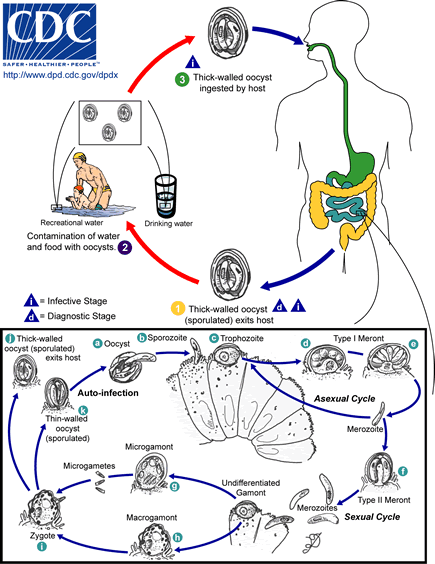Cryptosporidium is a microscopic parasite that causes
the diarrheal disease cryptosporidiosis. The parasite and the disease are known
as "Crypto." There are several species of Cryptosporidium that
infect both humans and animals. The Cryptosporidium has an outer shell
that protects and allows the parasite to survive outside the body for long durations.
The outer shell makes the parasite tolerant to chlorine disinfection.
The parasite
can be transmitted in many ways. The most common modes of transmission include
drinking water and recreational water in every region of the United States and
throughout the world. The parasite typically comes from run off water from
cattle farms.
Identify statistics about
its prevalence around the world
United States: In 2009, 7656 confirmed and probable cases of
cryptosporidiosis (2.5 per 100,000 population) were reported. In 2010, 8951
confirmed and probable cases (2.9 per 100,000 population) were reported. Cases
were reported in children aged 1–9 years and adults aged 25–29 years.
Cryptosporidium Life Cycle
Cryptosporidium Treatment Options
§ Anti-parasitic drugs: E.g., nitazonide (Alinia) to reduce diarrhea by compromising
metabolic processes of cryptosporidium organisms, azithromycin (Zithromax) in
combination with one of these drugs for people with compromised immune system.
§ Anti-motility agents: E.g., loperamide and its derivatives (Imodium A-D) slow down
movements of intestine and increase fluid absorption to alleviate diarrhea and
restore normal stools.
§ Fluid replacement: Oral or
intravenous replacement fluids and electrolytes, including sodium, potassium,
and calcium, all maintain body fluid balance by keeping body hydrated.
§ Antiretroviral therapies: For those with HIV/AIDS, increasing active
antiretroviral therapy (HAART) can decrease viral load in the body and boost
immune response. Restoration of immune system to a certain level may resolve
symptoms of cryptosporidiosis.
Cryptosporidium Means of Prevention
§ Practice
good hygiene, including washing hands with soap and water after using the toilet and
changing diapers, and before and after eating.
§ Thoroughly
wash fruits
and vegetables with uncontaminated water. Avoid eating foods suspected of
contamination. Avoid uncooked foods when traveling in developing countries.
§ Purify
drinking water
if traveling in an area with a high risk of infection or having a weakened
immune system.
§ Limit
swimming activities in lakes, streams and public swimming pools, particularly if water
is likely to be contaminated or if one has a compromised immune system.
§ Avoid
fecal exposure
during sexual activity.
§ Carefully
handle newborn farm and domestic animals. Wash hands after handling these animals.
References:
http://www.cdc.gov/parasites/crypto/
http://www.mayoclinic.org/diseases-conditions/cryptosporidium/basics/definition/CON-20030375
http://www.cdc.gov/healthywater/swimming/rwi/illnesses/cryptosporidium.html
http://www.cdc.gov/parasites/crypto/biology.html
http://www.cdc.gov/mmwr/preview/mmwrhtml/ss6105a1.htm
https://images.search.yahoo.com/images/view




No comments:
Post a Comment